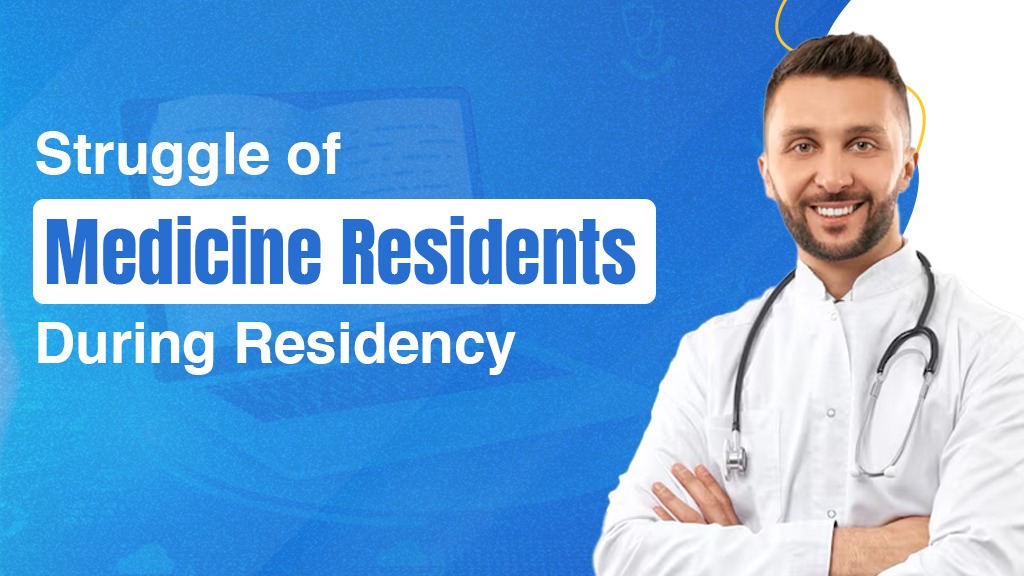
Estimated reading time: 4 minutes
Medicine residency is generally seen as the turning point for every resident’s life to become a confident, skilled, and independent physician. While this phase holds huge learning, which comes with mental, physical, and emotional tolls that are often invisible to the outside world.
Residency in internal medicine is among the most demanding experiences a young doctor goes through. They have to go through long working hours, limited sleep, emotionally deep-down situations, and high expectations that create a constant battle between clinical responsibilities and personal well-being. From the emergency room to ICU wards, every moment demands accuracy, judgment, and emotional strength.
In this blog, let’s explore what makes the journey of a medicine resident so challenging.
The Unseen Battles Behind the White Coat
Basically, medical Residents often give 80-100 hours per week. Which includes hectic night duties, back-to-back ward rounds, and unpredictable emergency calls, it has now become a regular part of life. While these hours of their duty aim to train residents to handle the peer pressures of real-world medicine, they leave little room for rest, family time, or self-care.
The lack of proper sleep affects not only their physical health but also decision-making and clinical judgment. It can cause you serious consequences.
Constant Pressure to Learn and Perform
You know what, Medicine is a rapidly evolving field nowadays. Medicine Residents are expected to stay up to date with all the clinical guidelines for their exams, valuable research papers, and new treatment protocols, all while working full-time. There’s a strong pressure to perform during ward rounds, ICU discussions, and academic sessions.
You should see your mistakes as a learning opportunity, but they usually have that fear of being judged by seniors or letting down a patient, which can take a big step on confidence and morale.
Emotional Fatigue and Compassion Burnout
Medicine residents deal with anxiety and death far more than most people of their age, because they have to be in that kind of environment, which makes them feel like this. Breaking bad news, managing critical patients, and supporting families through their tough times become part of their daily routine.
While giving and showing empathy is essential in internal medicine, repeated emotional exposure can lead to compassion fatigue.
The Challenge of Clinical Decision-Making Under Supervision
In medicine residency, supervision is a part of their training; they usually find themselves in a fuzzy area. Given thousands of responsibilities without any sovereignty. The pressure of managing some of the complex cases in the ICU or emergency settings under watchful eyes adds to performance anxiety and self-doubt.
For better understanding, residents can also explore this insightful post that touches on the evolving journey of a medicine resident on Conceptual Medicine’s official blog:
Learning Never Stops: From PG to Super-Specialist
Realities Medicine Residents Face
Unpredictable Daily Schedules
- They have unpredictable duties such as Ward duties, emergency calls, ICU shifts, all shuffle daily, leaving no room for routine or planning.
- Their Meal timings and sleep cycles are not fixed; they are often disrupted.
Inadequate Sleep
- During rotations, so many residents get less than 4-5 hours of sleep.
- Because of sleep deprivation impairs judgment, focus, and mood.
High Academic Expectations
- Residents are required to study for the NEET SS or MRCP exams while doing full-time clinical work.
- The peer pressure to present at journal clubs, seminars, and participate in case discussions.
How to Cope with the Struggles?
Medicine residency is undeniably tough, but several strategies can help:
Build a Support System
- Stay connected with fellow residents. Shared experiences create strong bonds.
- Talk to seniors or faculty mentors when you feel overwhelmed.
Time Management
- Utilize intelligent learning platforms like Conceptual Medicine to maximize study time.
- Schedule short study blocks during breaks and use weekends efficiently.
Stay Inspired
- Watch motivating and academically enriching content on
Conceptual Medicine’s YouTube Channel
Closing Thoughts
The struggles of medicine residents are very real, but so are their resilience and passion. They work tirelessly to become the future guardians of healthcare, often sacrificing their health in the process. While the system has room to evolve, what keeps most medicine residents going is a deep-rooted sense of purpose.










